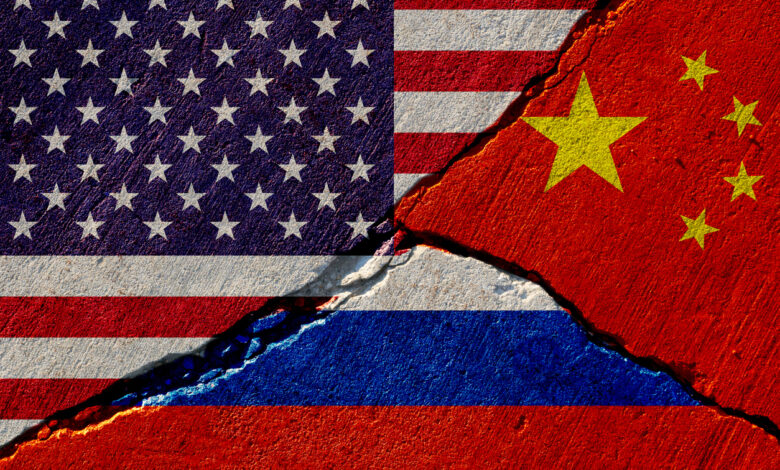Overreaction? Taking Stock of the Top Foreign Policy Predictions of 2022

I have a confession to make. I spend too much time watching sports on TV and reading about them on-line. You would too if you were professionally obligated as I have been for the past thirty years to spend your days drinking from the gushing fire hydrant of cable and Internet US and international news. Sports offers clear winners and losers and the perfect combination of emotionally engaging yet comparatively low-stakes drama. It’s relaxing. The rest of the news not so much.
A bonus to all the mindless diversion sports provides is that occasionally, accidentally, I learn something that I can use in my day job. For example, recently, it has become popular on sports programs and in sports reporting to present a take du jour and ask whether it is an over-reaction to recent events. This is offered as an attempt to cut through conventional wisdom, recency bias, half-baked analysis, and the usual tsunami of bullshit that you will find in social media.
To illustrate, let’s apply this approach to a number of the most often cited predictions for 2022 in global affairs.
For example…
TAKE DU JOUR: A COLD WAR WITH CHINA IS INEVITABLE
This is one of the most popular perspectives you’ll hear in Washington DC policy circles these days. With the end of the global war on terror and our military fiascos in Iraq and Afghanistan, the defense establishment is retracing its post-Cold War steps in search of a new enemy. China fits the bill for them. It’s big. It’s becoming richer. It’s becoming a rival for global influence. We disagree on a wide range of important issues. And defense contractors see maintaining superiority over such an advanced foe as the kind of budgetpalooza they love. Furthermore, in American politics, you score points for being tough on China whether you are a Democrat or a Republican. As for the Chinese, they are intent on flexing their muscle and they respond to US efforts at intimidation by asserting themselves.
REALITY CHECK: OVER-REACTION
Sure, if we commit ourselves to a Cold War, fill our press with scary images of Chinese “wolf warriors” and over-hyped stories about Chinese military breakthroughs (without mentioning they equal levels we achieved forty or fifty years ago), we can make conflict with China more likely. But here’s the real deal: The Cold War with the USSR was a zero-sum game. If the Soviets lost ground, we gained and vice versa. The US and China are deeply interdependent economically and face a variety of global issues (like climate change) that we can’t address effectively without working together. Further, neither side wants to fight each other. We’re vastly superior militarily at the moment. And on core issues like Taiwan, for all our tough talk the likelihood we would go to war to protect it is low.
TAKE DU JOUR: RUSSIA WILL INVADE UKRAINE
Russia has 70,000-100,000 troops deployed along the border with Ukraine. Intelligence reports suggest Vladimir Putin is seriously considering an incursion into that country, perhaps a massive one. The US and our NATO allies have made it clear that Russia will face “severe consequences” should it invade. The Ukrainians are preparing for the worst. Should Russia invade, it knows that major Western powers would not intervene militarily to stop it and would instead resort to economic and political sanctions. Right now, the situation along that border is among the most dangerous in the world and should Russia invade using the whole force it would result in Europe’s biggest military conflict since World War II.
REALITY CHECK: OVER-REACTION
As of Christmas Day, Russia’s Interfax news agency reported ten thousand of the Russian troops were being redeployed away from the border. In January, the US and Russia will enter further talks to avert an invasion. Putin reportedly wants assurances Ukraine will not join NATO. Publicly, the US cannot give such assurances. But privately, discussions about Ukraine’s entry into NATO can and likely will be postponed indefinitely. That won’t hurt Ukraine much as the West has already demonstrated a real commitment to putting pressure on Russia on its behalf. At the same time, for all its military strength, Russia would not have a cakewalk in Ukraine. The Ukrainians would fight hard to defend their land. (Russia knows this because the fighting in the Donbas has continued for years since Russia took Crimea.) Russia could be bogged down there in an expanded conflict for a long time which it cannot afford. Nor can it afford harsh western sanctions, many of which would likely target the personal fortunes of Putin and his cronies. Putin will declare victory at home and the West will breathe a sigh of relief.
TAKE DU JOUR: THE US AND IRAN WILL NOT BE ABLE TO FIX THE NUKE DEAL TRUMP BROKE
The U.S. and Iran and the other parties to the Iran nuclear accords have reentered talks to try to undo the damage done by Trump’s decision to unilaterally pull out of that deal in May 2018. So far, progress has been agonizingly slow. Further, Iran has taken advantage of the opening created by the American’s breach to resume its uranium enrichment activities. Estimates are that it is now very close to being able to produce enough bomb-grade uranium to make a weapon—perhaps just a matter of a few weeks away. Seeing this very predictable development, even some senior Israelis that were egging on Trump to pull out of the deal now realize it was a terrible mistake. But freezing the Iranians at where they are now would leave the situation in the region very precarious and getting the Iranians to turn back the clock hardly seems in their interest. Further, the country’s leadership is more hardline on these issues than they were in 2015 when the JCPOA was first signed…and, for very good reasons, they don’t trust the US to honor whatever deal is reached. And they have no desire or real incentive to back off on other advances they have made, as in the area of their missile programs which have improved by leaps and bounds.
REALITY CHECK: NOT AN OVER-REACTION
While some of the negotiators are expressing guarded optimism that they will find their way to a deal, time is running out. Either Iran will stop advancing its nuclear weapons program, put it on hold, and give the talks some more time, or the entire discussion will become moot. Failure is not a sure thing by any means, but the risk of collapsed talks and an escalation of tensions around this issue is sufficiently high that it is time for all the parties to start planning for that eventuality. Step one will be doing what is necessary to try to keep Israel from launching an attack that could escalate into a complicated and protracted regional war. There has been plenty of saber rattling on that front in recent months (and years) and the consequences of a miscalculation following a breakdown in these talks would be grave. Further for the Biden Administration, there are few good options here. Should this spiral into a crisis, it will be one of Trump’s making but one that presents Bident with the choice of looking ineffective or of once again getting tangled up in a Middle Eastern mess at a moment when that is the last thing he wants to do.
TAKE DU JOUR: COVID WILL FADE AS A GLOBAL THREAT IN 2022
The trajectory of the COVID pandemic is, in ways, mimicking that of past major global outbreaks of disease as in the case of the influenza of 1918. In the last stages of that outbreak a more virulent variant that was also milder signaled it was running its course. Omicron follows a similar pattern. But the ability of developed nations to manage the Omicron spike in the pandemic is linked to the availability of vaccines and other resources necessary to combatting the not just the spread of the virus but also the severity of its consequences.
REALITY CHECK: OVER-REACTION
Billions of people in the emerging world will not get the vaccine until late 2022 or after. The disease will still spread within their communities and take a terrible toll. While COVID may gradually have less of an impact in the world’s more advanced economies as the Omicron surge recedes early in 2022, the poorest will continue to suffer with it. Further, every pandemic takes its own twists and turns and to the extent that the disease is not contained, future variants may present new challenges. Consequently, there are risks that may come with the disease being of less urgent concern in the world’s more prosperous nations. They could lose the sense of urgency in combatting the illness and in so doing, open the door to future bouts with it. Further, it remains quite possible that COVID in some form may be with us to stay indefinitely, requiring new vaccine regimens and rethinking of public health protocols.
TAKE DU JOUR: THE BIGGEST GEOPOLITICAL THREAT TO THE US IS THE RISE OF CHINA
Among the geopolitical challenges the U.S. faces from foreign nations, those from China may be the most formidable in the decades ahead. China is making major technological advances and is investing substantial in its military capabilities, especially in areas like cyber, space and AI which may be crucial in the conflicts of tomorrow. No other nation poses the combination of human, economic, technological and other strategic resources that China has among those with whom the US may compete or confront.
REALITY CHECK: WRONG REACTION
Foreign nations are not the prime geopolitical threats to American interests. Globally, the greatest threat is undoubtedly climate change, a destabilizing force that will exact high costs on us, our allies, and nations worldwide for the foreseeable future. But there is no threat to US strength like those we find at home—from domestic extremists to social division to economic inequality and, perhaps above all, to the systematic attack on our democratic system of government being pursued by the GOP. Should America cease to be a democracy, our international standing will be deeply damaged. Should we enter a period in which only the extreme right is able to win elections, major conflicts pursued for ideological reasons—against China, Iran and others—may also do grave damage to us and pose great burdens on our economy. For those concerned with US leadership, prosperity and security, priority number one must be defending our democracy.

